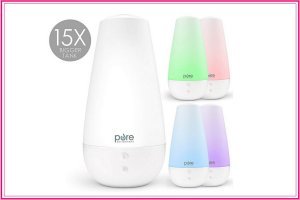
Rosemary is a fragrant herb well-known in culinary circles to spice up various recipes. Yet aside from its popularity with food, this evergreen shrub yields an essential oil useful in a variety of hair, skin and wellness products. Today, rosemary oil has become quite a popular addition to many a medicine closet or beauty regimen for its healthful benefits.
So what exactly is rosemary oil? What are its history and origins, and how can it help you with healing and wellness?
Read along to find out more about this crisp-scented, energizing oil.
The origins and history of rosemary
This wood-scented oil takes its place today from a long history dating back to the ancient times. The Romans were known to value its plant source, using it to adorn the statues of their gods, as well as in healing and religious ceremonies.
Rosemary has long been the symbol for remembrance, and its use has been recorded throughout history. The ancient Egyptians used sprigs of this woody shrub during funerals in coffins and tombstones to remember their loved ones. Ancient Greek students were also said to wear rosemary around their heads when studying to help with their memory.
One of the most famous references would be from Shakespeare’s Hamlet, where Ophelia says, “There’s rosemary, that’s for remembrance. Pray you, love, remember!”
Rosemary’s health benefits were known and recorded by early physicians such as Dioscorides and Galen, whose works mention various medicinal plants and herbs used until today.
Rosemary derives its name from two Latin words: “ros” meaning “dew” and “marinus” referring to the sea. Hence, it was often referred to in history as the “dew of the sea,” as it often grew abundantly by the seaside areas of the Mediterranean countries and North Africa. This name may also be an allusion to its glistening blue flowers that appear especially during winter.
Well-known throughout its native Mediterranean, rosemary and its healing benefits spread throughout the world. It has now become one of the most sought after herbs for cooking, healing and wellness.
What is rosemary oil made up of?
This aromatic oil comes from the fresh needle-like leaves and tops of the plant Rosmarinus officinalis, distilled with steam to extract the delicate essential oil. These extracts contain a mixture of natural
chemical components, which mainly include cineole, camphor, and other phenols responsible for the oil’s healing properties.
Rosemary comes from the same plant family as peppermint and lavender, so it’s not at all surprising that these plants yield essential oils for a variety of health benefits.
What are some benefits of rosemary oil?
Rosemary as a symbol of remembrance may have some basis after all, since the oil is best known to increase focus and improve memory. Additionally, it also has antimicrobial and anti-fungal properties, making it helpful against a number of skin conditions.
It has also been found to have anti-inflammatory activity. This, together with its refreshing and invigorating scent, makes it useful in relieving aches, tension and tired muscles and joints.
Rosemary oil has a wide range of uses, with recent studies even investigating its potential in anti-cancer research due to an active compound called carnosol found to be present in the oil. From easing mental stress to relieving physical ailments, you’ll be sure to find rosemary a very useful addition to your supply of healing substances.
Specific benefits of rosemary oil

1.) It boosts mental clarity and focus
A whiff of rosemary oil can chase away those moments at your desk when you feel mental fog seeping in. Place a drop or two of rosemary oil on your palms, rub together and inhale. A diffuser in your office or workspace can also do. You can also massage a diluted blend on your temples or use a personal inhaler whenever you need to relieve mental fatigue, like while driving on long trips or when doing after-hours work.
Read more: 5 Essential Oil Blends that Promote Focus and Concentration
2.) It stimulates hair growth
Adding a few drops of rosemary oil to your shampoo or hair mask can help promote hair growth. You can also dilute a few drops with a carrier and apply the mixture to the scalp, massaging it in and leaving it on for a few hours or overnight. Rosemary oil stimulates circulation and blood flow to the scalp, which in turn can stimulate hair growth. This increase in blood flow can slow hair graying, too!
Read more: 9 Essential Oils for Hair Growth (Plus 3 Mixtures & Application Tips)
3.) It improves memory
Rosemary has long been known as a memory aid. Various studies have shown that sniffing rosemary oil may increase memory up to 60-75 %! This may be because one of its components make certain chemicals in the brain last longer. Additionally, scientists think that its scent helps stimulate the brain’s memory center. Rub a drop or two of rosemary oil between your palms and inhale, or diffuse rosemary oil throughout the room when working on tasks that require a memory boost.
4.) It can help relieve respiratory problems
Throat congestion, cough, colds and symptoms of the flu can be relieved by rubbing a few drops of oil over the chest and throat. Rosemary oil can also help combat infections due to its antiseptic properties. It can also help relieve asthma symptoms to some extent due to its antispasmodic property where it helps relax the airways.
Read more: How to Safely and Effectively Inhale Essential Oils
5.) It can refresh and soothe tired muscles
Rosemary oil’s ability to help promote circulation can invigorate tired muscles in your arms, shoulders and legs. Its ability to help relieve pain also helps relieve muscle aches at the end of a rigorous day. Use it as a blend with a carrier oil or add it to your favorite massage lotion base.
Read more: 9 Essential Oils for Sore Muscles / Muscle Pain
6.) It helps reduce joint and nerve pain
If you’re suffering from arthritis, rheumatism, and other nerve and joint pains, massaging rosemary oil onto the affected area can greatly reduce the pain. Its anti-inflammatory effects can help relieve joint swelling in arthritis and rheumatism, while its analgesic effects can help with neuralgias.
Read more: 10 Essential Oils for Fibromyalgia / Fibrositis
7.) It reduces tension, stress and fatigue
If you’re feeling stressed and overwhelmed, stop awhile to breathe in the scent of rosemary oil from an inhaler or diffuser. You can also breathe in the oil while massaging it onto your temples. Rosemary oil has been found to alleviate stress and tension by decreasing the levels of the stress hormone cortisol. Together with lavender oil, it can also decrease episodes of anxiety.
Read more: 14 Uplifting Essential Oils for Energy & Wakefulness
8.) It can help treat skin conditions
Rosemary oil is quite useful for a number of skin ailments by virtue of its antimicrobial and anti-fungal effects. It can help fight off acne, eczema, and dermatitis. You can either massage the diluted oil onto the affected areas of your skin, or mix a few drops into your favorite moisturizer or toner. Rosemary oil also helps keep dryness at bay and gives your skin an even, youthful appearance. On the scalp, it also helps keep away nasty dandruff flakes.
Read more: 5 Essential Oil recipes for Dry, cracked and Flaky Skin
9.) It can be used for oral care
Being an antiseptic, rosemary oil can be added to mouthwash formulations to keep away bad bacteria that cause bad breath and oral infections like gingivitis. It also helps keep plaque buildup and cavities at bay. Simply mix 15-20 drops of rosemary oil with one cup of distilled water (best to shake this mixture first in a covered container) and swish around your mouth for a few minutes. You can also add in other essential oils like peppermint for that minty flavor and to add to the antiseptic effect.
Read more: How to Make a Healthy Mouthwash using Essential Oils
10.) It keeps insects away
Insects and unwanted bugs are repelled by the scent of rosemary oil. Place the oil around openings such as windows and doors. You can also make a spray for curtains or load the oil into a diffuser to prevent bugs from entering the room.
Read more: 7 Essential Oils for Bee Stings, Bug Bites & More
11.) It boosts immune function
Rosemary oil contains a lot of antioxidants that help fight off disease and infection. Regular inhalation of rosemary oil allows its antioxidants to enter the bloodstream and fight off free radicals, or harmful chemicals that damage cells. This antioxidant content, along with its ability to decrease cortisol levels, can assist adrenal function which plays an important role in immunity.
12.) It soothes indigestion and stomach cramps
If you often get nasty stomach cramps, bloating and indigestion, massaging rosemary oil diluted with a carrier onto your belly can help. Its carminative effect can aid in expelling excess gas in the digestive tract, while its antispasmodic effect can relieve painful stomach spasms. Adding rosemary oil onto your warm bath water can also be effective.
Read more: Essential Oil based Remedies for PMS & Menstrual Cramps
13.) It reduces cellulite and stretch marks
If you have unwelcome stretch marks and dimply cellulite over your thighs and abdomen, rosemary oil can help. Mix a drop or two of rosemary oil with a carrier like coconut, rosehip or jojoba oil, and massage daily onto areas with stretch marks and cellulite. Rosemary’s ability to improve circulation can help improve the appearance of cellulite. It is also able to help skin cells regenerate and appear more youthful, thus helping fade out those nasty stretch marks.
Read more: 7 Best Essential Oils for Cellulite (Plus 5 Mixtures and Application Tips)
14.) It helps in skin healing
By virtue of it’s anti-inflammatory and antiseptic effects, rosemary oil can be used in small amounts to speed up wound healing. Recent studies have found that it also helps in wound closing and regeneration of skin tissue. Dab on a mixture of rosemary oil diluted with a carrier on scrapes, cuts, and even surgical wounds to help speed up recovery. It also helps improve the skin’s appearance and thus lightens blemishes and scars.
Read more: 11 Essential Oils for Healing Scars
Things to keep in mind when using rosemary oil
Rosemary oil can be utilized for a wide variety of health and beauty concerns, yet, as with all essential oils, some caution must be taken when using it.
Before using rosemary oil, be sure to test for any allergic reactions. People with sensitive skin may experience itching, irritation or stinging, so it’s always best to test it on your skin first and use it in diluted form.
If you have certain conditions such as epilepsy, hypertension, and other conditions, its best to first consult your physician or health care practitioner for advice. If you are pregnant or breastfeeding, do not use rosemary oil as it may cause harm to the unborn baby. Also, ingestion of rosemary oil is not advisable, as its potency can cause vomiting, spasms and other harmful effects.
With its many uses, rosemary oil is very versatile and can be combined with many other essential oils. It blends well with lavender, citronella, cedarwood, peppermint, frankincense, geranium, cardamom, lemongrass, and basil oil.
Recipes and applications for rosemary oil

1.) Rosemary Lavender Nourishing Shampoo
Ingredients:
- 10 tablespoons baking soda
- 3 tablespoons olive oil
- 20 drops rosemary oil
- 10 drops lavender oil
- 6 oz. aloe vera gel
Instructions:
Place all ingredients in a clean glass container or jar. Mix together until mostly homogenous, making sure that the essential oils blend in well with the olive oil and aloe gel. You can now cover with a lid and store. Shake the container well before using.
To use, simply get the amount you usually need for your hair. Massage into a lather and rinse. This shampoo works great for relieving an itchy scalp, reducing dandruff, and promoting hair growth!
2.) Rosemary Hair Rinse
Ingredients:
- 4 cups of water
- 15 drops rosemary oil
- 2 tablespoons apple cider vinegar
Instructions:
Warm the water over your stove. Note that the temperature shouldn’t be too hot as this will make the rosemary oil evaporate. Once the water is just about warm, add in the rosemary oil and apple cider vinegar. Stir to mix.
To use:
After rinsing out your shampoo, get a suitable amount of the rosemary hair rinse and pour over your hair and scalp, allowing it to thoroughly soak in. Leave it on for about 3 to 5 minutes. You can then either rinse it out, or leave it on your hair to dry. Note that leaving it on your hair will make it have that vinegar smell, so this second option is best done when staying home.
The rosemary helps combat itchy scalp and promotes hair growth, while the apple cider vinegar helps condition and cleanse your hair.
3.) Skin and Muscle Relief Recipe
Ingredients:
- 5 tablespoons carrier oil (argan, coconut,sesame, sweet almond, jojoba, grapeseed, macadamia)
- 20 drops rosemary oil
- 20 drops lavender oil
- 20 drops peppermint oil
Instructions:
In a glass container or small jar, blend together all the ingredients. Use on itchy skin and scalp, on minor cuts and scrapes to promote healing and reduce scarring, or as a massage to relieve muscle and joint pains.
4.) Decongestant Vapor-rub
Ingredients:
- 1/2 cup coconut oil, olive oil or almond oil
- 2 level tablespoons grated beeswax or beeswax pastilles
- 10 drops rosemary oil
- 20 drops lemon oil
- 20 drops eucalyptus oil
Instructions:
In a double boiler, melt the beeswax and mix in the carrier oil (coconut, olive or almond oil). Add in the essential oils, and continue stirring until the oils are evenly distributed. Pour into a small, wide mouth
container with a lid, like a clean ointment jar or tin can. Use this rub on the nose, cheekbones, or chest to chase away respiratory congestion brought about by colds, cough, and flu. When using for babies and younger children, its best to make another formulation with the amount of essential oils cut in half and apply to the chest and feet only.
Conclusion

Rosemary oil is very versatile and can be used for daily health and overall well-being.
We hope you found this article useful and informative! We’d love to hear your questions or additional recommendations about rosemary. Let us know in the comments below!










